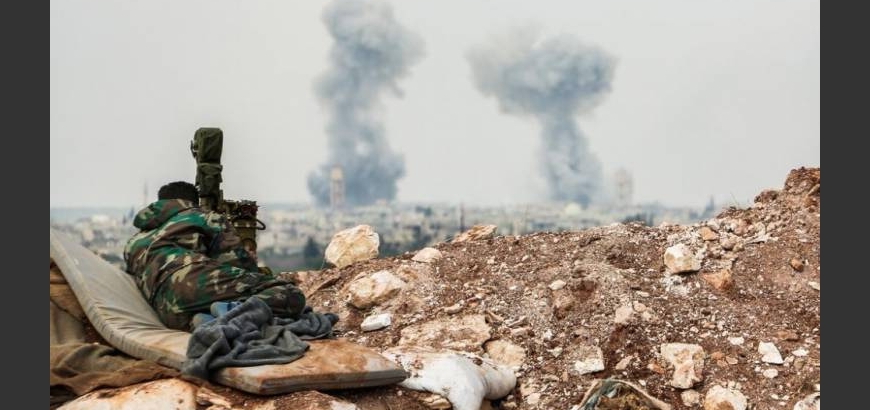The Assad regime has revoked a ceasefire agreement in Idleb province and declared the resumption of its military operations, attributing this to violations by opposition groups.
On Monday, the Assad regime Defense Ministry issued a statement, in which it said that: “terrorist groups in the de-escalation zone in Idleb have refused to comply with the ceasefire and have carried out a number of attacks on civilians in the surrounding safe areas.”
It added: “In light of the fact that agreement to the ceasefire was conditional on Ankara fulfilling any of its obligations to the Sochi agreement, and that this has not been achieved despite the Syrian Arab Republic’s efforts in this respect, the army and armed forces are resuming their military operations against the terrorist groups, and will respond to their aggressions.”
Activists in Idleb province reported that regime warplanes carried out airstrikes around the city of Khan Sheikhoun in the southern Idleb countryside moments after the statement was issued on the official SANA news agency, as well as on the town of al-Kabana in the northern Lattakia countryside.
Helicopters dropped barrel bombs on the town of al-Ltamenah in the northern Hama countryside.
The guarantor countries (Turkey, Russia and Iran) agreed at the 13th round of Astana talks to the Syrian regime and opposition’s deal for a truce in the northern Idleb province, which has seen battles for the past four months.
After the announcement of a ceasefire in Idleb, the Free Syrian Army groups represented by the National Front for Liberation agreed to comply, saying that they would respond to any breach by Assad’s forces on the Hama countryside fronts.
Hay’at Tahrir al-Sham said in a statement that it agreed in principle to the ceasefire in northern Syria, adding that, “we are aware of Russia and the Assad regime’s military campaign in the area and the exposure of the truth of the collapsing regime.”
The Asia and Africa section director in the Kazakh Foreign Ministry, Mukash Sirikuli, said after the announcement of the ceasefire that, “the main portion of the Syrian opposition participating in the Astana talks has agreed to the ceasefire in Idleb.”
According to statements carried by the Russian Sputnik agency, he added that: “The participants declared a ceasefire and this decision went into effect, but there are other terrorist groups in the same place such as the Islamic State and al-Qaeda who have not complied. But the main part of the opposition represented here agreed.”
The Assad regime’s Defense Ministry accused Turkey of not implementing the Sochi agreement, adding that this has, “helped bolster the position of terrorists and to spread the threat of terrorism across Syrian territory.”
Despite the announcement of the ceasefire, the artillery and rocket fire from Assad’s forces has not ceased, focusing on Jisr al-Shaghour and the town of Badama in the western countryside.
Russian reconnaissance planes have continued to fly above northern Syria along with the rocket and artillery fire.
On Sunday, Tahrir al-Sham commander Abou Mohamed al-Jolani refused to implement the terms of the Sochi deal in Idleb, saying that a ceasefire in the province was not an agreement because it had not been signed and had no time period.
Jolani said in statements carried by the Abaa news agency: “The formula, through which the ceasefire was issued, is not an agreement and was not signed and has no term set. It is similar to the formula that ended fighting between us and the regime, whereby the two sides stop attacking, but remain alert and ready.”
This article was translated and edited by The Syrian Observer. The Syrian Observer has not verified the content of this story. Responsibility for the information and views set out in this article lies entirely with the author.


